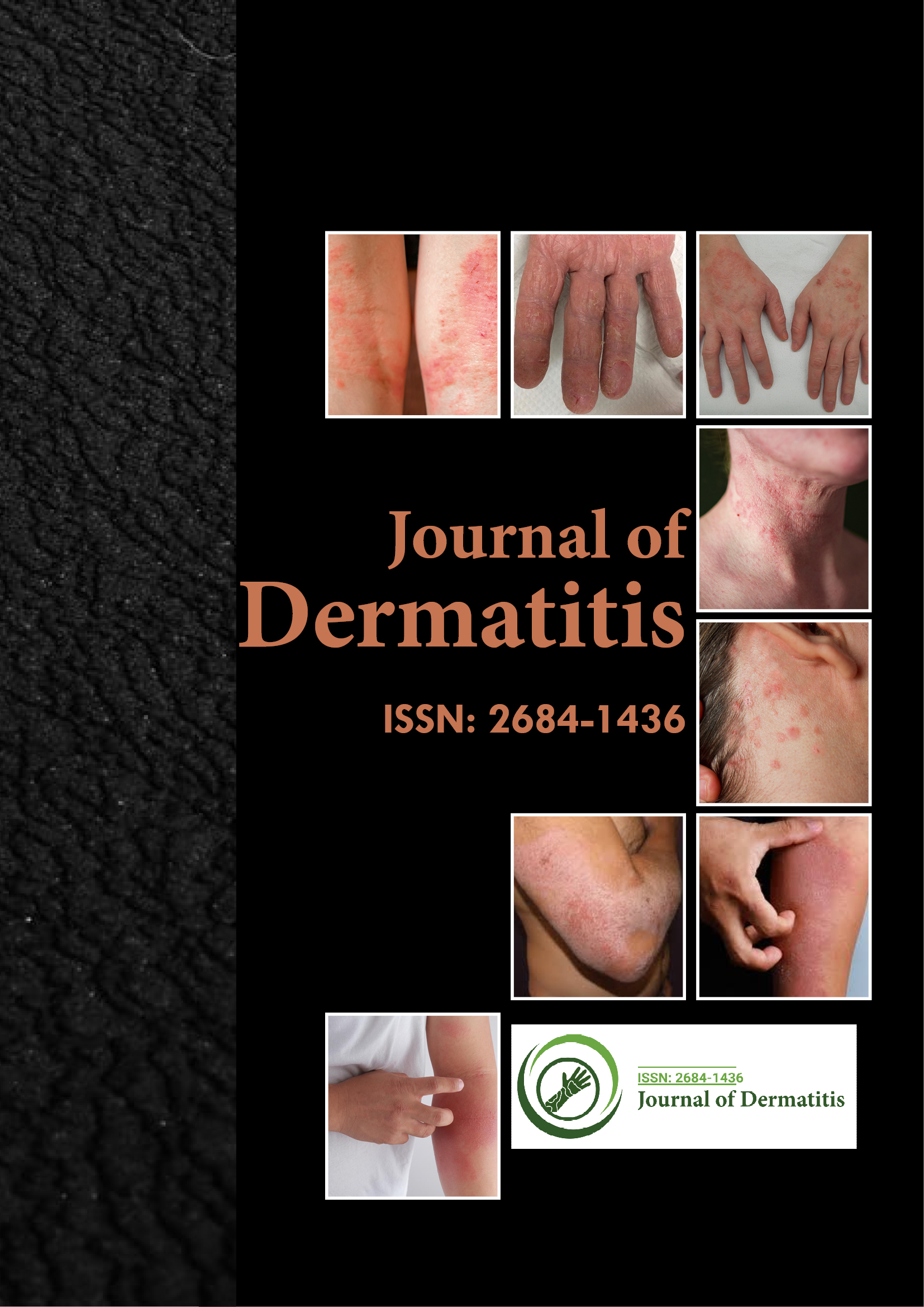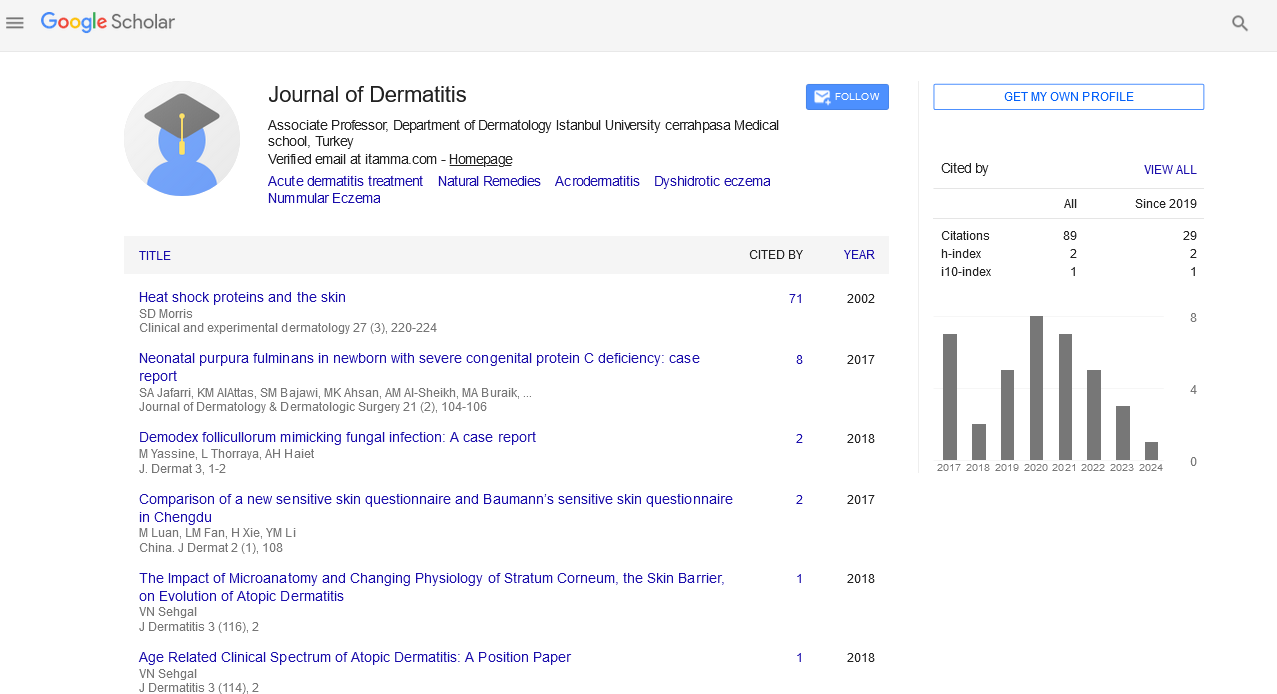Indexed In
- RefSeek
- Hamdard University
- EBSCO A-Z
- Euro Pub
- Google Scholar
Useful Links
Share This Page
Journal Flyer

Open Access Journals
- Agri and Aquaculture
- Biochemistry
- Bioinformatics & Systems Biology
- Business & Management
- Chemistry
- Clinical Sciences
- Engineering
- Food & Nutrition
- General Science
- Genetics & Molecular Biology
- Immunology & Microbiology
- Medical Sciences
- Neuroscience & Psychology
- Nursing & Health Care
- Pharmaceutical Sciences
Commentary - (2025) Volume 10, Issue 2
Psychosocial Impact of Dermatitis on Quality of Life
Angele Soria*Received: 19-Jan-2024, Manuscript No. JOD-24-24654; Editor assigned: 23-Jan-2024, Pre QC No. JOD-24-24654 (PQ); Reviewed: 06-Feb-2024, QC No. JOD-24-24654; Revised: 06-Jan-2025, Manuscript No. JOD-24-24654 (R); Published: 13-Jan-2025, DOI: 10.35248/2684-1436.25.10.273
Abstract
Description
Dermatitis, encompassing a spectrum of inflammatory skin conditions, extends its impact beyond the physical region, profoundly influencing the psychosocial aspects of an individual's life. The redness, itching, and discomfort associated with dermatitis can have far-reaching consequences on mental health, self-esteem, and overall quality of life. Understanding the psychosocial dimensions of dermatitis is crucial for developing holistic approaches to patient care that address not only the physical symptoms but also the emotional and social challenges faced by those living with dermatitis.
The visible nature of dermatitis lesions, whether in the form of red, scaly patches, oozing blisters, or dry and cracked skin, can evoke self-consciousness and feelings of embarrassment in affected individuals. This heightened self-awareness may lead to social withdrawal, avoidance of public spaces, and a reluctance to engage in social activities. The psychosocial impact of dermatitis often extends beyond the physical symptoms, influencing various aspects of daily life and interpersonal relationships.
One of the key psychosocial challenges faced by individuals with dermatitis is the stigma associated with visible skin conditions. Society's often unrealistic standards of beauty and the pervasive misconception that flawless skin equates to health and attractiveness contribute to the stigmatization of those with dermatitis. This stigma can result in feelings of shame, reduced self-esteem, and negative body image, perpetuating a cycle of emotional distress.
In addition to the societal stigma, individuals with dermatitis may experience internalized shame and negative self-perception. The constant visibility of skin lesions can create a sense of being "different" or "abnormal," leading to a distorted self-image. The psychosocial impact of dermatitis on self-esteem and body image can be particularly challenging, affecting not only the individual's perception of themselves but also their confidence in social interactions.
The psychosocial burden of dermatitis extends to emotional wellbeing, with a heightened risk of anxiety and depression among affected individuals. The chronic nature of dermatitis, characterized by recurring flares and periods of remission, adds an element of unpredictability to the emotional toll. The uncertainty of when symptoms may worsen can create a constant anxiety, affecting an individual's ability to enjoy life and engage in everyday activities.
It is essential to recognize that the psychosocial impact of dermatitis is not solely a consequence of the visible nature of skin lesions. The persistent itching and discomfort associated with dermatitis can significantly disrupt sleep patterns, leading to fatigue and irritability. Sleep disturbances contribute to the overall emotional burden, exacerbating feelings of frustration and affecting an individual's ability to cope with the challenges posed by dermatitis.
Parenting a child with dermatitis introduces additional psychosocial challenges. Parents with feelings of guilt, worrying about the impact of the condition on their child's well-being and social interactions. Children with dermatitis may experience teasing or bullying, further exacerbating the psychosocial impact and potentially affecting their social development and selfesteem.
The workplace is another arena where the psychosocial impact of dermatitis comes into play. Individuals with visible dermatitis lesions may face discrimination or judgment in professional settings. Concerns about how colleagues or supervisors perceive their condition may lead to increased stress and workplacerelated anxiety. This psychosocial burden can, in turn, affect job performance and job satisfaction.
Addressing the psychosocial impact of dermatitis requires a multidisciplinary approach that goes beyond medical management. Dermatologists and healthcare professionals play a crucial role in acknowledging and validating the emotional challenges faced by individuals with dermatitis. Patient education is essential, helping individuals understand the chronic nature of dermatitis and providing coping strategies for managing stress and emotional well-being.
Psychological interventions, such as Cognitive-Behavioral Therapy (CBT), can be beneficial in helping individuals with dermatitis develop coping mechanisms and resilience. CBT focuses on changing negative thought patterns and behaviors, providing practical tools to manage stress and improve emotional well-being. Support groups and counseling services can also create a safe space for individuals with dermatitis to share their experiences and receive empathetic support.Conclusion
The psychosocial impact of dermatitis goes beyond the visible symptoms, affecting various aspects of an individual's life. The emotional toll, stigma, and challenges in interpersonal relationships highlight the need for a comprehensive and empathetic approach to dermatologic care. By addressing the psychosocial dimensions of dermatitis, healthcare professionals can enhance the overall well-being of individuals living with this chronic skin condition. Empowering individuals with dermatitis through education, psychological support, and self-care strategies contributes to a more holistic and patient-centered approach, recognizing that the impact of dermatitis extends beyond the skin.Citation: Soria A (2025) Psychosocial Impact of Dermatitis on Quality of Life. J Dermatitis. 10:265.
Copyright: © 2025 Soria A. This is an open access article distributed under the terms of the Creative Commons Attribution License, which permits unrestricted use, distribution, and reproduction in any medium, provided the original author and source are credited.

